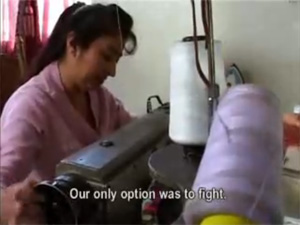![]()
[Editor's Note: This week we will have a series of reviews on films with a focus on immigration. Check back each day for a new film review, and visit www.faithandimmigration.org for more information]
 Everybody is working for the weekend, unless you're a grad student, which we are. Really, graduate school is prolonged adolescence -- lots of reading and writing to avoid the 40-hour grind that is adulthood. In today's world, everyone seems to be looking for the way to avoid working 40 hours. Start your own business, find that niche product, or order that money-making book from the guy with question marks on his jacket. All of this is done to avoid working harder than we have to.
Everybody is working for the weekend, unless you're a grad student, which we are. Really, graduate school is prolonged adolescence -- lots of reading and writing to avoid the 40-hour grind that is adulthood. In today's world, everyone seems to be looking for the way to avoid working 40 hours. Start your own business, find that niche product, or order that money-making book from the guy with question marks on his jacket. All of this is done to avoid working harder than we have to.
Made in L.A. challenges those sentiments on the daily grind. In our Los Angeles backyard is another story -- a story of women working 12-hour days for little pay. This film tells the story of three women who are fighting for what many privileged young adults try to avoid: a reasonable, well-paid, 40-hour work week.
Made in L.A. is the story of Lupe, Maura, and Maria who work in the garment industry in downtown Los Angeles. These women and others organize to collectively bargain for fair wages, a 40-hour work week, and their dignity (no, really, that's all). The three-year fight takes these women from their homes in L.A. to New York to Washington and even to Hong Kong to make people aware of their working conditions subcontracted by the clothing line Forever 21. Along the way, these women are empowered as the key stakeholders in their community leading the charge for economic justice.
In this film we are given a bird's-eye view inside major issues plaguing us today -- from immigration, large-scale labor negotiations, to outsourced manufacturing. Global injustices are given local voices. No longer are these issues faceless; we see Lupe, Maura, and Maria. Made in L.A. is an invitation to engage personally with the stories of women who seek after simple luxuries (as if it's acceptable to call an 8-hour work day a "luxury").
At its core, this film is a story that challenges our notions of a "good sale." Forever 21 is not the enemy, which begs the question, "Who is?" Certainly it cannot be our capitalistic leanings or our need for glitter t-shirts, but neither is the blame placed on individuals working toward the same working rights as the next person. Nonetheless, these "good sales" come at the exploitation of another person. The aim of the movie is simple: to make the viewer aware.
Sweatshop manufacturing does not only occur "over there," across the ocean. The fight for decent wages happens in our respective backyards, with people we pass on a daily basis. The film calls us to awareness that our luxuries do not belong to everyone and they come at a cost. At times witty and other times touching, Made in L.A. accomplishes a straightforward goal: with persistence, everyone can help create a better life for the community around us.
Both prolonging adolescence, Matthew Johnson (westcoastmatt.blogspot.com) and Nicole Higgins (rareblackbirds.wordpress.com) are graduate students at Fuller Theological Seminary in Pasadena, California.
+ FREE Download: "Reel Images of Immigration: A Movie Guide to Discussing Faith and Immigration": Check out movie summaries and discussion questions on featured immigration films. Plus, learn how to host a film screening for your friends or small group.
Got something to say about what you're reading? We value your feedback!